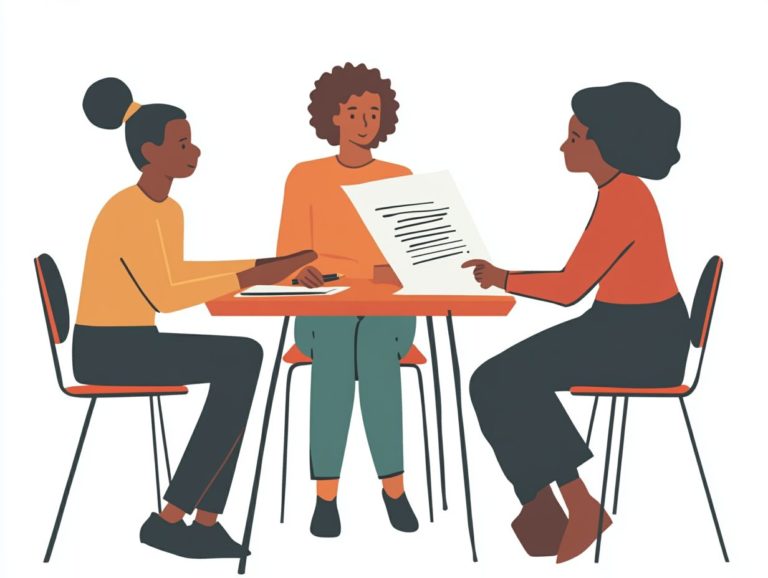The Right Approach to Negotiating Interest Rates
Navigating the landscape of interest rates can feel overwhelming, but understanding them is vital for making astute financial decisions.
This article covers the basics of interest rates, emphasizing the significance of negotiating them to maximize your savings. Key factors that impact these rates include current economic conditions, your personal credit history, and practical tips for effective negotiation.
By the end, you will have the knowledge and strategies necessary to secure the most favorable terms for your financial agreements.
Contents
Key Takeaways:

Negotiating interest rates can save you money over time by potentially lowering your monthly payments and overall cost of a loan. Before negotiating, research current rates and offers, and gather necessary documents to present a strong case to lenders. Effective communication and understanding different lender approaches can lead to successful negotiation and a favorable interest rate.
Understanding Interest Rates
Understanding interest rates is important for you as a homebuyer, as these rates are crucial in determining your mortgage payments and overall borrowing costs.
Mortgage rates can fluctuate considerably based on economic conditions, the type of mortgage you select such as a fixed-rate or an adjustable-rate mortgage and your credit score.
By familiarizing yourself with the intricacies of these rates, you can make informed decisions that could lead to substantial financial savings throughout the duration of your home loan.
What are Interest Rates and How Do They Work?
Interest rates represent the cost of borrowing money, expressed as a percentage of the loan amount. They hold significant sway over the terms of your home loan, including the annual percentage rate (APR), which shows you the true cost of borrowing, not just the interest.
This financial metric doesn’t just influence your monthly mortgage payments; it also reflects the overall expense of the loan throughout its lifespan.
For you as a borrower, grasping the difference between nominal interest rates and APR is essential. While nominal rates showcase the basic cost of borrowing, APR includes additional fees and costs tied to the loan, offering a clearer perspective on your total expenditure.
As interest rates fluctuate due to various economic factors, these changes can profoundly impact market conditions, guiding buyers’ decisions and ultimately shaping the dynamics of the housing market.
The Importance of Negotiating Interest Rates
Negotiating mortgage rates is an essential strategy for you as a homebuyer looking to secure lower rates, translating into significant monthly savings over the course of your loan.
By skillfully communicating with mortgage brokers and grasping the nuances of loan estimates, you can leverage your position to attain more favorable terms and conditions.
Why Negotiating Can Save You Money

Negotiating interest rates can unlock substantial savings on borrowing costs, enabling you to lower your monthly mortgage payments and alleviate your overall financial burden.
Statistics show that even a slight adjustment in the interest rate can translate into thousands of dollars saved over the life of a loan. For example, a 1% reduction on a $300,000 mortgage could save you around $60,000 over 30 years.
Your credit score is pivotal in this negotiation process; higher credit scores often qualify you for more favorable rates. Case studies demonstrate that individuals who actively manage their credit scores by paying debts on time and keeping their credit utilization low significantly enhance their negotiating power.
This proactive approach can lead to considerable financial rewards. Are you ready to save on your mortgage?
Factors that Affect Interest Rates
Several factors influence mortgage interest rates, including economic conditions, your personal credit history, and the specific policies of lenders and financial institutions.
By grasping these variables, you empower yourself to make informed decisions when applying for FHA loans, VA loans, or USDA loans.
Economic Conditions and Personal Credit History
Economic conditions, like inflation and employment stats, greatly influence mortgage interest rates set by lenders. Your personal credit history also plays a key role in this process.
For instance, when inflation rises, central banks often increase interest rates to slow down spending. This can lead to higher mortgage costs for potential homeowners.
If your credit history is strong marked by timely payments and low debt compared to your income you might secure a lower rate, even in challenging economic times.
Experts say that maintaining excellent credit can save you thousands over the life of a loan. Statistics show that people with credit scores above 760 often get rates nearly 1% lower than those with scores below 620.
Preparing for Negotiations
Preparing for negotiations means doing thorough research on current rates and understanding loan estimates. This knowledge gives you leverage when working with mortgage brokers.
As a first-time homebuyer, familiarize yourself with different programs. Be cautious of any credit report fees that might affect your negotiations.
Researching Current Rates and Offers

Researching current rates and offers is crucial for negotiating effectively with lenders. Accessing various online tools can provide you with essential information.
Websites that specialize in financial comparisons show current mortgage rates and let you see loan estimates from multiple lenders side by side.
Studies reveal that homebuyers who compare offers from at least three lenders save an average of $3,000 over their loans. Pay attention to the annual percentage rate (APR); it shows the true cost of a mortgage, including interest and fees.
Thorough research boosts your confidence and empowers you to secure the best deal.
Gathering Necessary Documents
Gathering documents like loan estimates and financial information is essential for negotiating effectively. This prepares you to present a strong case to lenders.
Key documents, including proof of income and credit reports, help lenders understand your financial health. Being organized with this information lets you advocate for better interest rates and terms.
Showcasing your solid financial standing can instill confidence in lenders, leading to better deals.
Tips for Negotiating Interest Rates
Effective communication is vital for negotiating interest rates, whether with one lender or multiple institutions. Approach negotiations with confidence and use informed techniques to foster positive interactions.
This proactive mindset enhances your negotiating power and can lead to more favorable terms.
Effective Communication Strategies
Using effective communication strategies can significantly help you negotiate better mortgage rates. Skills like clarity and confidence allow you to convey your needs more effectively.
When discussing interest rates, express your specific expectations upfront. A confident tone shows conviction, while assertiveness indicates your desire for a mutually beneficial agreement.
Clearly outlining your financial situation can prompt lenders to tailor their offers better. These strategies promote understanding and make navigating mortgage negotiations easier.
Negotiating with Different Lenders

Negotiating with various lenders can lead to a range of outcomes, as each financial institution has its own policies and rates. It’s crucial for you to explore multiple options.
By taking the time to compare offers from different mortgage lenders, you can discover not only more competitive interest rates but also unique terms, incentives, or fees that may enhance your financial situation.
Approach your negotiations with an understanding of the fundamental differences in the offers you receive. This includes the total cost of borrowing expressed as a yearly interest rate (commonly known as the Annual Percentage Rate or APR), loan origination fees, and closing costs.
Leveraging these diverse elements empowers you to negotiate more effectively, encouraging lenders to present better rates or even waive certain fees. Ultimately, a thorough assessment of multiple proposals will enable you to make well-informed decisions, maximizing your financial advantage.
Finalizing the Negotiation
Finalizing the negotiation requires you to meticulously review the agreement and terms established during your discussions. This careful examination is crucial to ensure a successful outcome as a home buyer, particularly regarding your mortgage payments.
Reviewing the Agreement and Terms
Reviewing the agreement and terms is a vital step in your negotiation process. Pay close attention to mortgage interest rates and loan estimates.
In addition to these components, scrutinize the fees associated with the mortgage, including origination fees, closing costs, and any potential prepayment penalties that could affect your overall expenditure.
Also, consider the terms surrounding adjustable-rate mortgages, as these can fluctuate over time and impact your monthly payments. Evaluating the length of the loan and any special conditions outlined in the agreement offers valuable insight into your long-term financial commitments.
By being thorough in this review process, you can ensure that your mortgage aligns perfectly with your financial goals and budget.
Ensuring a Successful Outcome
To achieve a successful outcome in your mortgage negotiations, you must employ effective negotiation techniques and maintain open lines of communication with lenders. This requires a delicate balance be adaptable while clearly articulating your specific needs to avoid misunderstandings.
Arriving well-prepared with comprehensive market research can enhance your credibility during discussions. This demonstrates to lenders that you are informed and serious about the process. Stay alert to potential pitfalls to safeguard your financial future, such as overcommitting or losing sight of your personal financial limits.
By fostering a collaborative atmosphere, you significantly increase the chances of reaching a mutually beneficial agreement that aligns with your long-term goals.
Frequently Asked Questions
What is the right approach to negotiating interest rates?
The right approach to negotiating interest rates involves understanding your financial situation, researching current market rates, and effectively communicating with the lender.
Why is it important to negotiate interest rates?
Negotiating interest rates can save you money in the long run by potentially lowering your monthly payments and overall interest paid on a loan.
When is the best time to negotiate interest rates?
The best time to negotiate interest rates is before agreeing to a loan or credit card offer. This gives you the opportunity to compare rates and negotiate for a better deal.
What factors should be considered when negotiating interest rates?
When negotiating interest rates, consider factors such as your credit score, income, and loan term. These can all affect the lender’s willingness to negotiate.
How should I approach negotiating interest rates with a lender?
Be confident yet respectful when negotiating interest rates with a lender. Clearly communicate your financial situation and what you believe to be a fair interest rate based on market research.
What can I do if the lender is not willing to negotiate interest rates?
If the lender is not willing to negotiate interest rates, consider shopping around for other lenders or exploring alternative options such as credit unions or peer-to-peer lending platforms.
Start negotiating now for the best rates available!






